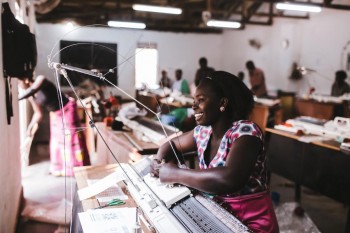By: Betsy Naymon

On my first day at work, I pulled, picked, stretched, measured, and tried on about three hundred knit hats. Not all the products were perfect—in fact, a large amount had to be rejected due to errors that didn’t adhere to the strict quality that we hold our American retail products to. I handed back hats to ex-child soldiers, widows, victims of domestic abuse. I felt awful, as my decisions would impact the paychecks of the women working to produce their weekly assignment of hats. I was frustrated at first, as my job seemed more about telling these ladies about their errors rather than watching them move through a program that aimed to empower and give agency to previously disenfranchised members of the community. I was not mentoring them, nor was I assisting with the education they needed in tandem with their jobs to live lives free of outside aid. I have learned endlessly about international development, nonprofit work, and community-based organizations, and I flew to Uganda ready to apply that knowledge to my first co-op. But, as a co-op should, my experience has filled gaps in my education and taught me that true poverty alleviation does not just happen when American volunteers bring their grand ideas to an impoverished country. But, it can happen with a hat.
Krochet Kid international’s (KKi) model focuses on holistic empowerment with a sustainable job and income as the centerpiece, all which lead up to a graduation once the woman has demonstrated she has the capacity to succeed on her own. The organization works with beneficiaries both in Lima, Peru and Gulu, Uganda where they produce knit and crochet hats, accessories, and clothing. Gulu is a post-conflict zone still reeling from a senselessly violent civil war. This left the northern town trailing behind as the rest of the country reached economic stability, and provided a unique atmosphere for a multitude of NGOs to swoop in from the West, all believing they had the answer to the extreme conditions in Gulu.
A unique pillar of KKi’s work in Gulu is its employment of Ugandans not only as beneficiaries, but as the main employees in charge of development. Americans do not take any part in the programming side of the model, but rather deal solely with production. This allows each culture to work to their strengths. As Americans, we can not pretend that we have all the answers to a war we did not experience and to a culture we did not grow up in, but we do hold knowledge about American retail and fashion culture and the quality standards expected of products. What results is a harmonious intertwining of nationalities, each adding their own assets to create the unique model and impressive impact of Krochet Kids..
My co-op at a social enterprise involves the centerpiece of social entrepreneurship: sustainability. The jobs these ladies have and the skills we help them develop are priority, and the skills that I’m learning about business, leadership, and management are crucial to any market-based social venture.
In the two short months I have lived in Gulu, my ideas of social enterprise and development has changed. Education is not the main factor, nor are simple handouts, or ideas taught in school. No model is perfect, but the best all hold common characteristics. First, a reliable source of income for beneficiaries and a chance to use the skills learned outside of a program is essential for true and impactful development. This means an emphasis on business and economics, rather than just personal development. Second, it is essential for idealistic Americans, such as myself, to learn and accept their place in a culture different from their own, and allow community agents to be the ones that lead the conversation regarding the personal growth and develop ment of beneficiaries.
ment of beneficiaries.
While it took me a while to understand the impact of my work, I am now extremely grateful to be a part of an incredible blend of cultures and strengths, whether it be business and production or impact and development,that make our program successful, meaningful, and ethical.


